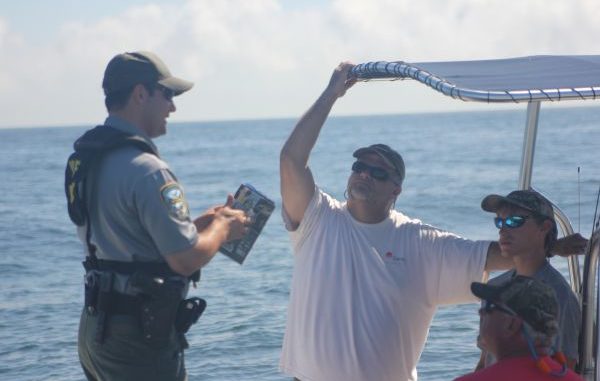
Why poachers get slaps on the wrist
A reader recently inquired about how and why some fish and wildlife offenders get off the hook with light or minimum penalties — and in some cases escape prosecution altogether.
Those are very good questions and worthy of some discussion. I’ll do my best to provide some answers and a few suggestions as to how we as hunters and fishermen can do our part to make sure violators are prosecuted.
As a young and enthusiastic agent, I worked hard and issued my share of citations for fish and wildlife offenses. Some were for minor offenses such as license or boating violations. Others were for more serious crimes, including closed-season violations, over limit take and illegal night hunting.
It did not take long to notice the disappointing frequency of dismissals and minimal fines imposed by the district attorney’s office. The disposition description on the agency copy of the citations was a blunt “No Action Taken.”
If a fine was imposed at all, it was “bond forfeiture, $19.50.”
That was not much considering the effort put forth to make the case and the severity of some of them.
By nature, I have never been one to question authority very much, and dismissal or “tap on the wrist” fines was understandable in some situations. But on other occasions it was hard to accept.
Things came to a head with a night-hunting case.
An older agent and I apprehended two men in a truck spotlighting deer on a public road at 2 in the morning after several long, cold nights of waiting.
I filed the case, and the results were two $19.50 bond forfeitures for each offender. Thirty-nine-dollar fines for hunting at night with light and gun, hunting from a public road and hunting from a moving vehicle.
Deciding I had nothing to lose, I requested a meeting with the district attorney. He met with me willingly and listened to my concerns.
He admitted to not having thought about it from my prospective, and promised to bring the two offenders in and prosecute for additional fines. He kept the promise and instructed me to bring cases like this one to his attention in the future.
Opening that line of communication was a turning point, and things improved. Prosecution did not always go the way I liked, but when it did not the district attorney was honest enough to tell me he would not prosecute.
Sometimes he acknowledged it was for political reasons, and that was just a fact of life to be accepted. But I had more wins than losses.
That district attorney and I are both retired now. But we still have a lot of respect for each other.
Sometimes a case might be dismissed or the offender might receive a minimum fine due to circumstances that make it the right thing to do.
I will always remember one such case.
Dove season was set to open on Saturday. On Friday afternoon, I received a report of dove hunting. The given location was in a field between two busy public roads. It was very visible and not a good place to hold an illegal hunt.
Thinking it was probably a group shooting clay targets for practice, I drove to the field.
Much to my surprise, three men were in the field shooting doves. One even had a Brittany spaniel retrieving downed birds. They saw my marked unit approaching, and smiled and waved — no running or hiding.
I drove up, got out and asked them to gather up, which they did without hesitation. I asked how the hunt was going and they said, “Great!”
We talked a little more about hunting and how well the dog was working while I looked at licenses and guns. All were in order.
I finally had to get down to it and tell them we only had one problem: Season did not open until tomorrow.
“Oh no!” they all said, “It opened on Sept. 1.”
I asked why they thought it opened that day.
“Fred down at the shop said it opens on the (Sept.) 1,” was the answer.
Taking a hunting regulations booklet from the truck, I handed it to one of them and pointed to the dates for dove hunting. They were sick, but accepted the citations without complaint.
It was never made clear whether Fred meant the first Saturday in September, which was correct, or the date of Sept. 1.
On arraignment day in U.S. Magistrate’s Court, they appeared before a magistrate known for tough sentencing. When asked to enter a plea, one hunter spoke for all three and said they would plead guilty but he would like to say something.
The magistrate allowed it. The hunter began by saying he appreciated how I had handled the matter, and went on to explain it was an honest, albeit careless, mistake.
When he had finished the magistrate looked at me and asked if I believed it to be an honest mistake. I assured him that I did.
The magistrate thought for a moment and said, “I order each of you to pay a fine of $25.”
Justice and fairness had prevailed.
Those are examples of how and why an offender might evade prosecution or heavy penalties. Sometimes it is for good reasons and sometimes for bad ones.
At times, the blame for poor or no prosecution falls on law enforcement when it should not. If the wildlife agents in a given district are doing their jobs (and they usually are), prosecution is the responsibility of the district attorney and the courts.
Some years ago, a well-known statewide wildlife organization began applying pressure to the Department of Wildlife and Fisheries by demanding the agency provide disposition on all cases filed with the district attorney’s offices in all judicial districts. The problem was that, though they should provide disposition information to the agency, not every DA’s office was doing so, and LDWF was and still is in no position to command a district attorney to do anything.
And one sure way to lose all chances of getting any prosecution whatsoever is to get on the wrong side of a DA. It was a well-meaning but misguided attempt to leverage LDWF into forcing the district attorneys to improve accountability on wildlife offenses.
Over time, a better understanding of how the system works and whose job it is to do what has evolved. Sportsman in a number of parishes have developed a keen interest in monitoring and tracking serious wildlife offenses making their way through the adjudication system. They don’t hesitate to contact the DAs and judges to let them know they are watching.
Those sportsmen are also voters, a fact not lost on elected officials.
Many DAs and judges welcome the interest in and support of good prosecution. One DA greatly improved his prosecution rate after local sportsmen took interest. He commented that, for years, he only heard from people trying to evade prosecution or those trying to help someone else avoid it; he was happy to hear from sportsmen and felt well-supported by a majority of voters who wanted poaching stopped.
The best example of such support to date is the Avoyelles Wildlife Federation, which monitor LDWF news releases regarding arrests and maintains open lines of communication with wildlife agents working in Avoyelles Parish.
Members also frequently communicate with the DA and judges about wildlife offenses. AWF members are also strong supporters of Louisiana Operation Game Thief Inc., the statewide cash reward for wildlife crime information organization.
As a result, offenders in Avoyelles are frequently required to make donations to LOGT as part of a plea agreement or penalty, and prosecution is better than ever.
But member of an outdoor organization or not, anyone can get involved in making sure poachers don’t get off the hook. Contact your local wildlife agents and inquire about prosecution in your parish. If it could be better, contact the DA and judges and demand better.
Let them know you are a sportsman and this is the Sportsman’s Paradise, not the Poacher’s Paradise.
Got a question? Ask Keith!
If you have a question about wildlife and fisheries enforcement, shoot a note to Keith LaCaze at klacaze15@att.net.




